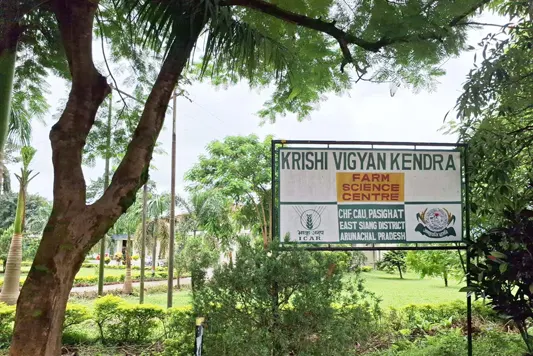[Prafulla Kaman]
PASIGHAT, 5 Sep: Eminent scientists and agriculture experts serving in different institutions in East Siang district have expressed support to the recent decision of the union Cabinet regarding approval of schemes for improving the farmers’ lives and livelihoods.
The union Cabinet, chaired by Prime Minister Narendra Modi, on 2 September approved seven schemes to improve the farmers’ lives and increase their income, with a total outlay of Rs 13,966 crores. These schemes are designed to modernise agriculture, enhance food security, and support sustainable farming practices across the country, keeping in view sustainable and profitable products for farmers.
The budget approval includes sustainable development of horticulture (Rs 860 crores), strengthening of Krishi Vigyan Kendras (KVK, Rs 1,202 crores), natural resource management (Rs 1,115 crores), strengthening agriculture education, management and social sciences (Rs 2,291 crores), sustainable livestock health and production (Rs 1,702 crores), Digital Agriculture Mission (Rs 2,817 crores), and crop science for food and nutritional security (Rs 3,979 crores).
KVK subject matter specialist Togi Riba expressed optimism that the Centre’s initiative would bolster the network of KVKs across the country and ensure that the farmers have access to the latest agricultural technologies and practices.
Riba expressed confidence that the fund allocated to the KVKs would help the KVK here to “set up a bio-input production unit having large-scale production capacity;high-tech infrastructure for demonstration of agriculture farming, diary and improved poultry farming; dripped irrigation; and livestock-keeping and procurement of vehicles for transportation of farmers during training.”
College of Horticulture & Forestry Dean Prof BN Hazarika said that “the policy is definitely a boon for the farmers and commercial horticulturists of the northeastern region.
“The policy may bring revolution in the field of agriculture and enhance the economy of the farming communities,” he said.
Dr Hazarika observed that “the measure on sustainable development of horticulture included in the central government’s scheme aims to increase farmers’ income from horticultural activities.
“It focuses on the development of various horticulture crops, vegetables, floriculture, mushrooms, and plantation crops such as spices, medicinal, and aromatic plants,” he added.
College of Agriculture Agronomy Assistant Professor Dr Premaradhya N opined that “fund allocation under Digital Agriculture Mission will leverage technology to enhance farmers’ lives through the development of digital public infrastructure.”
The mission incorporates modern technologies like farmer’s registration, data entry, and mobile connectivity to facilitate farmers in getting information about modern agriculture technologies, besides addressing their problems in terms of seasonal cultivation, crop management and pest control management by using a distance support system.
Moreover, extension of 5G internet will facilitate farmers to use the ‘krishi decision support system’, which utilises geospatial data, weather and satellite information, groundwater data, and crop yield modelling to support decision-making.
“The initiative, under the Indian Council of Agricultural Research, will promote agricultural research and education in line with the New Education Policy-2020, incorporating advanced technologies and emphasising natural farming and climate resilience,” Dr Premaradhya said.




